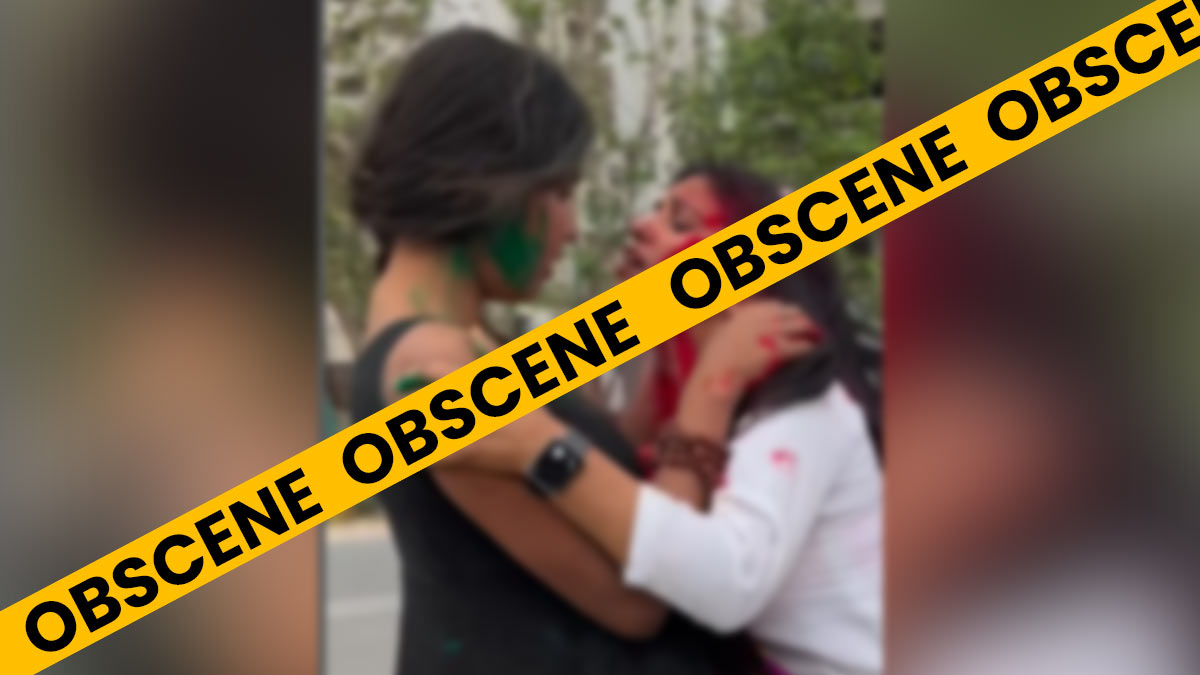
Just when we thought we had our fill of obscene social media content, another video packed with filth inundated our feeds. Following a video featuring two girls lip-syncing to 'Ang Laga De', while intimately applying colours to each other, another video of a young man riding with two girls seated behind him, engaging in an obscene dance to the same song has now surfaced.
The Noida traffic police imposed a ₹33,000 fine on a vehicle for violating the Motor Vehicles Act of the Indian Penal Code, and not 'obscenity'. This one social media reel has sparked a crucial discussion online - 'Do we need such obscene content online?'. Furthermore, why aren't individuals who post such indecent content online subjected to legal consequences?
Watch the video here:
View this post on Instagram
To get insights into the legal aspects of the matter, we spoke to our legal expert, Siddharth Chandrashekhar, Advocate and Legal Counsel, Bombay High Court.
Section 292
The law prohibits the selling or publishing of content (books, paintings, pamphlets) that is sexually suggestive.
Section 293
Under this section, selling or giving obscene items to anyone younger than 20 years of age is punishable. The punishment for this could be up to three years in jail and a fine of up to Rs 2,000 for the first time, and up to seven years in jail with a fine of up to Rs 5,000 for a second offense.

Section 294
Doing anything obscene in public places is illegal. Offenders can face up to three months in jail and a fine.
Sections 67A of the IT Act
The law covers sexually explicit content on the internet. Sharing or creating sexually explicit content online is illegal under the act. For the first conviction, the offender can face up to five years in jail and a fine of up to ₹10 lakh, and for the second conviction, the penalty is up to seven years in jail and a fine of ₹10 Lakh.
Don't Miss: Beyond Likes And Shares: Navigating The Impact Of Social Media On Making Women More Vulnerable to Abuse
Two weeks back, the Ministry Of Information and Broadcasting (I&B) announced the blocking of 18 over-the-top (OTT) platforms for their obscene, vulgar content. 19 websites and 10 applications from Google's Play Store and Apple's App Store and 57 social media accounts connected to these platforms were also blocked. Union Minister Anurag Singh Thakur shared that these digital platforms undermined societal morals in the name of creative freedom. However, there has been no official introduction of guidelines for social media users to clearly define what constitutes obscenity.
Under Indian law, obscenity is not clearly defined. To date, Indian courts rely on different factors namely to understand what constitutes obscenity, but these usually revolve around content that is indecent or sexually explicit. However, the absence of a precise legal definition always leads to multiple interpretations.
“The concept of obscenity is inherently context-dependent and culture-specific, varying from one society to another and evolving with changing social norms and scientific knowledge. As moral standards are subjective, defining obscenity with precision is a daunting task. What is considered a piece of literature in Germany may be obscene in France, and what is considered in both countries as not harmful to public order and morals may be obscene in India,” the expert added.
It's unfortunate that despite the Noida-based influencers crossing boundaries by sharing obscene content on their Instagram, they were only charged for violating vehicle laws. This sparks the urgent need of having a clear legal framework to assess whether such content qualifies as obscene material. These guidelines will enable platforms like Instagram and Facebook to comply with regulations under Indian law and further take measures to remove objectionable content more effectively.

With people of all ages having access to social media today, it is paramount to safeguard vulnerable audiences, especially children and teens. Exposure to inappropriate content can lead to psychological harm. Having a set legal framework in place can help social media users have a clearer understanding of the laws and regulations governing online content. Punishing influencers for publishing obscene content online will set an example for others and serve as a deterrent for other social media users to engage in similar content creation. The rise of obscene content on social media also has the power to contribute to broader cultural shifts, given that everyone is on social media today. Don’t you think?
A disgusting video of a couple sipping and spitting a soft drink into each other's mouth in Delhi metro went viral a few days back. Despite Delhi metro officials appealing to their passengers to report such acts and the outrage the video sparked on social media, it didn't deter social media influencers from creating similar content.
New day, New Delhi metro scenepic.twitter.com/yVhPV6mzcb
— if (@pioneer2610) October 10, 2023
Also, shouldn't social media influencers rethink their content choices? To what extent today are we willing to push the boundaries in pursuit of fame?
Also watch this video
Herzindagi video
Our aim is to provide accurate, safe and expert verified information through our articles and social media handles. The remedies, advice and tips mentioned here are for general information only. Please consult your expert before trying any kind of health, beauty, life hacks or astrology related tips. For any feedback or complaint, contact us at [email protected].